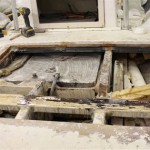How Much Does It Cost To Install Ceramic Floor Tile?
Installing ceramic floor tile is a popular home improvement project, offering a durable and aesthetically pleasing flooring option. However, understanding the costs involved is crucial for budgeting and planning. The overall price of ceramic tile installation can vary significantly depending on several factors, including the size of the area, the type of tile chosen, the complexity of the installation, and the labor costs in your geographic location. This article provides a comprehensive overview of the various cost components associated with ceramic floor tile installation, enabling readers to make informed decisions about their project.
Ceramic tile is a versatile material composed of clay, minerals, and water, fired at high temperatures. It is known for its durability, water resistance, and ease of maintenance. Ceramic tile comes in a wide range of styles, colors, sizes, and textures, making it suitable for various applications, including floors, walls, and backsplashes. The cost of ceramic tile itself is a significant factor in the overall expense of a tile installation project. Different types of ceramic tiles have different price points, based on their quality, design, and origin.
Beyond the cost of the tile itself, there are other materials and labor involved in a typical ceramic tile installation. The surface underneath the tile might need to be prepared; in some instances, the existing flooring must be removed and the subfloor leveled. Setting materials such as mortar, grout, and sealant are also required for proper installation. The installation process also necessitates specialized tools such as tile cutters, notched trowels, and grout floats. Labor costs also vary depending on the complexity of the project and the experience of the installer.
Key Cost Factors in Ceramic Tile Installation
The total cost of ceramic tile installation is influenced by a variety of factors, which can be broadly categorized into material costs, labor costs, and other miscellaneous expenses. Understanding these key cost factors is essential for preparing an accurate budget and avoiding unexpected expenses.
Material Costs: This encompasses the cost of all materials required for the installation, including the ceramic tiles themselves, mortar, grout, sealant, and any subfloor preparation materials. The price of ceramic tiles can vary widely, from inexpensive mass-produced options to high-end designer tiles. Mortar is used to adhere the tiles to the subfloor. Grout fills the spaces between the tiles, providing a watertight seal and enhancing the overall appearance. Sealant is applied to the grout lines to protect them from staining and moisture penetration. If the subfloor is uneven or damaged, it may need to be repaired or replaced before tiling can begin, which will add to the material costs.
Labor Costs: The cost of labor is a substantial portion of the total cost. Labor costs are determined by factors such as the complexity of the installation, the size of the area, and the installer's hourly rate or per-square-foot charge. More intricate patterns or designs, such as herringbone or mosaic installations, require more time and skill and will thus command a higher labor cost. Removing existing flooring, preparing the subfloor, and dealing with difficult layouts (e.g., around plumbing fixtures or oddly shaped rooms) can also increase labor costs.
Other Miscellaneous Expenses: These can include demolition costs, permits, disposal fees, and the cost of moving furniture. Removing existing flooring can generate waste that requires disposal, for which there may be associated fees. In some jurisdictions, a permit may be required for tile installation, particularly if it involves significant structural changes. Moving furniture out of the room can also be a cost factor, especially if you hire movers to do so. Furthermore, unplanned issues encountered during the installation, such as hidden damage to the subfloor, can lead to additional expenses.
Breaking Down Material Costs: Types of Ceramic Tile and Associated Prices
The cost of ceramic tile itself can vary dramatically based on several factors, the most prominent of which is the type of tile. Different types of ceramic tiles possess different qualities, influencing both their price and their suitability for specific applications. Here's a breakdown of common ceramic tile types and their typical price ranges:
Glazed Ceramic Tile: Glazed ceramic tiles are the most common type. These tiles have a protective coating applied to the surface, making them resistant to water, stains, and scratches. Glazed ceramic tiles are available in a wide range of colors, patterns, and finishes, making them a versatile choice for various applications. The price of glazed ceramic tiles typically ranges from $1 to $5 per square foot, depending on the quality, design, and brand.
Unglazed Ceramic Tile: Unglazed ceramic tiles, also known as quarry tiles, lack the protective coating found on glazed tiles. This makes them more porous and susceptible to staining, but it also provides a more natural, rustic look. Unglazed ceramic tiles are often used in high-traffic areas due to their durability and slip resistance. The price of unglazed ceramic tiles typically ranges from $2 to $6 per square foot.
Porcelain Tile: Porcelain tile is a type of ceramic tile that is denser and more durable than standard ceramic tile. Porcelain tile is fired at higher temperatures, which makes it less porous and more resistant to water, staining, and freezing temperatures. Porcelain tile is suitable for both indoor and outdoor applications, making it a popular choice for patios, walkways, and swimming pool decks. The price of porcelain tile typically ranges from $3 to $10 per square foot, depending on the quality, design, and brand. While technically a type of ceramic, its superior qualities justify a separate consideration.
Other Material Costs: Besides the tile itself, consider the cost of mortar, grout, sealant, and subfloor preparation materials. These can add significantly to the project’s overall material expenses. High-quality modified thin-set mortar is usually preferable and could range from $20-$40 per bag. Grout is available in sanded and unsanded varieties, and the cost per bag ranges from $15-$30. Sealant is required to prevent water damage to grout lines and costs approximately $10-$20 per bottle. If the subfloor needs repair or replacement, factor in the cost of plywood or cement board.
Understanding Labor Costs: Factors Influencing Installation Charges
Labor costs generally represent a significant portion of the total ceramic tile installation expense. Several factors influence these labor costs, and it is essential to understand them to negotiate a fair rate and avoid unexpected charges.
Complexity of the Installation: Intricate patterns, such as herringbone or mosaic designs, require more time and skill to install than simpler layouts. These more complex installations will typically command a higher labor cost. Diagonal patterns also increase the number of cuts needed and therefore necessitate more time and labor, raising the price.
Size and Shape of the Area: The larger the area to be tiled, the more labor will be required, and the higher the overall cost. Oddly shaped rooms or areas with many corners and angles also increase the complexity of the installation and can add to the labor costs. Small spaces, while requiring less tile, can sometimes be difficult to navigate and might also slightly increase labor costs.
Subfloor Preparation: Proper subfloor preparation is crucial for a successful tile installation. If the subfloor is uneven, damaged, or unstable, it will need to be repaired or replaced before tiling can begin. Subfloor preparation can include leveling, patching, or installing a new subfloor. The amount of preparation required will affect the labor costs. Self-leveling compounds may be necessary to create a perfectly flat surface. Removing existing flooring adds to the time and effort needed, therefore increasing the overall labor cost.
Installer's Experience and Location: Experienced and licensed tile installers typically charge higher rates than less experienced installers. However, hiring a qualified installer can ensure a high-quality installation that will last for years to come, potentially saving money in the long run by avoiding costly repairs or replacements. Labor costs can also vary depending on your geographic location. Areas with a higher cost of living generally have higher labor rates. It is always a good idea to obtain multiple quotes from different installers before making a decision.
Average Labor Costs: On average, labor costs for ceramic tile installation range from $4 to $14 per square foot. This range can vary depending on the factors mentioned above. For a simple installation with minimal subfloor preparation, the labor cost might be closer to the lower end of the range. For a more complex installation with extensive subfloor preparation, the labor cost could be closer to the higher end of the range. Make sure to discuss the scope of the work and get a detailed written estimate from the installer.
By carefully considering these factors, it is possible to obtain a more accurate estimate of the labor costs associated with ceramic tile installation and to make informed decisions about choosing an installer.

Tile Flooring Installation Cost Floor S Fixr

Ceramic Tile Flooring Installation Cost Fixr

Ceramic Tile Flooring Installation Cost Fixr

Tile Flooring Installation Cost Floor S Fixr

What Is The Average Cost To Install Tile Floors Rubi Blog Usa

Ceramic Tile Flooring Installation Cost Fixr

How Much Does Ceramic Tile Installation Cost 2025

Ceramic Tile Flooring Installation Cost Fixr

Tile Flooring Installation Cost Floor S Fixr

Cost To Tile A Bathroom Floor Average Install Tiles
Related Posts








